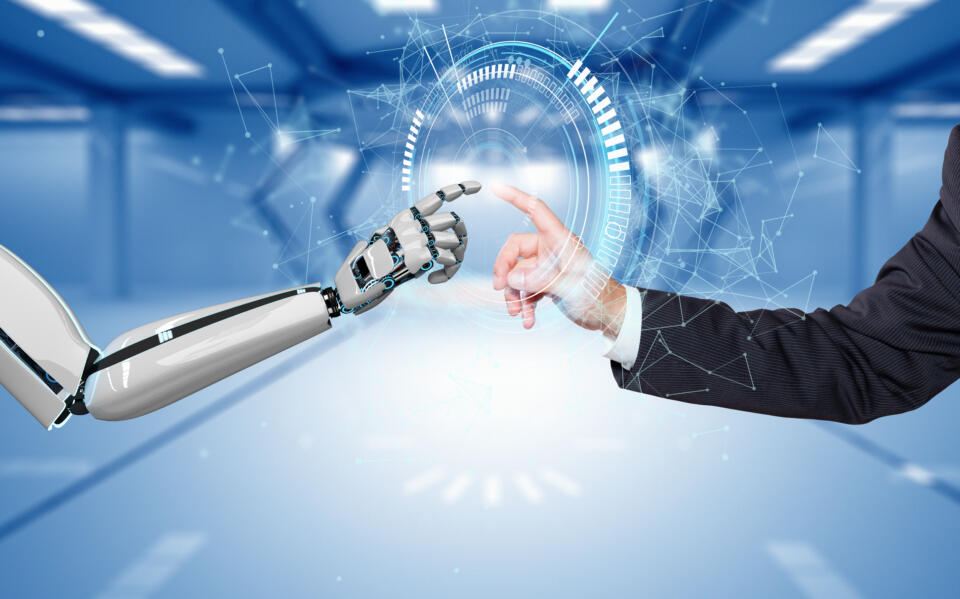
“A world of work with mixed robo-human teams would be a major step forward.”
You’ve been engaged in AI research for many years. Are we going to see mixed teams of real people and artificial intelligence systems at work in the near future and feel that that’s completely normal?
A world of work with such mixed teams would truly mark a major step forward for robotics and manufacturing in line with the hope that the utilization of workplace robots will enable us to enhance the effectiveness of many processes.

"I think that people generally have fears and concerns when it comes to the impact of innovations. That’s understandable because it’s never completely clear how changes resulting from an innovation will affect a person’s life."
From the steam engine to inspection robots in a nuclear powerplant: Again and again, we’ve invented machines that perform dangerous or monotonous jobs for us. Going forward, what kinds of jobs will AI and robots be handling for us?
That’s hard to predict. Currently, the deployment of robots in large logistics or distribution centers is being pursued intensively. The people working there must handle many parcels and sometimes cover longer distances on foot. That’s where robots can take a load off the workers and enhance efficiency. Other trials are focused on robots performing complex assembly processes in collaboration with humans. However, we still have a long way to go in that area.
Can you understand that some people are afraid of a world with intelligent machines? Or is our idea of robots excessively influenced by movies and dystopic fiction?
I think that people generally have fears and concerns when it comes to the impact of innovations. That’s understandable because it’s never completely clear how changes resulting from an innovation will affect a person’s life. Robotics and AI have great potential for innovations. However, movies and science fiction novels have a considerable impact and, unfortunately, not necessarily a positive one. In that genre, robots rarely play the role of the ‘good guys.’ Especially in Europe, that probably contributes to a somewhat negative image of robots.
Robots never get sick and are never in a bad mood. What characteristics must robots have for people to enjoy working together with them?
First, they must be reliable and perceived to be truly assistive. That’s a major challenge because robots are machines and therefore prone to wear. Their dialog or interaction with humans is particularly challenging. In fact, a lot more needs to be done to make robots easy to instruct and understandable. That’s a key prerequisite for acceptance of intelligent robots.
Will the feelings of their human co-workers need to be considered in the design of future workplace robots?
Robots should be responsive to humans, which, ideally, means that they should also respond to the feelings – and individual skills – of their users. In the context of human-machine interaction, the Turing test is a keyword. It’s based on the assumption that a system is truly intelligent when, in a dialog with it, it’s no longer possible to tell whether it’s a human or a machine. However, we’re still very far from having reached that level. The capabilities of smart voice assistants that are increasingly being used are a case in point.
What does an ideal robotic co-worker look like from a human perspective? What must a hotel or hospital robot look like for us to accept it?
That’s a very good question that I can hardly answer. We don’t know what the optimal bike or car looks like either. However, from a user’s point of view, robots should be versatile, flexible, effective and easy to instruct. For starters, their design must be functional and costs obviously play a role as well.
Are we going to sit in the virtual metaverse having a cup of coffee with our robotic co-workers someday?
I don’t really think so. Machines are primarily focused on work-related activities. When it comes to communication, I feel that, in most cases, we’re going to prefer another human being to a machine.
Is there such a thing as a psyche or conscious mind of an artificial intelligence? Are machines going to enjoy working because they feel motivated?
There are scientists teaching robots and dialog systems emotional skills, which might in fact make them resemble us more closely. The question about consciousness is obviously very exciting too. However, I doubt that we really need that with robots. Even if robots are going to be careful not to damage themselves, I don’t feel that that requires a conscious mind.
Do robots need social workers or teachers to train and teach them social behavior?
In my view, they won’t need any social workers but will need people to teach them things. The question of how people can easily and intuitively train robots to carry out an activity is a current research topic. This is another area with some intriguing problems. For instance, a robot should be able to judge whether or not it’s allowed to do certain things. Learning rules and social norms is a major challenge.
Some researchers anticipate a future devoid of any human work. Is AI going to put humans out of work in the long run or are there any jobs that a robot will never be able to do?
Well, you should never say never. I think that it’s highly unlikely that people will be completely out of work in the future. Take progress, for example. It decisively depends on human intuition and creativity. To emulate that with a robot is a challenge for which I personally don’t see any solutions even in the very distant future. In addition, there’ll always be things we won’t want AI systems to handle, such as administration of justice.



